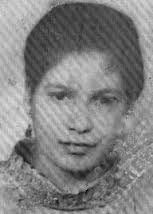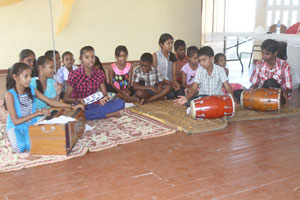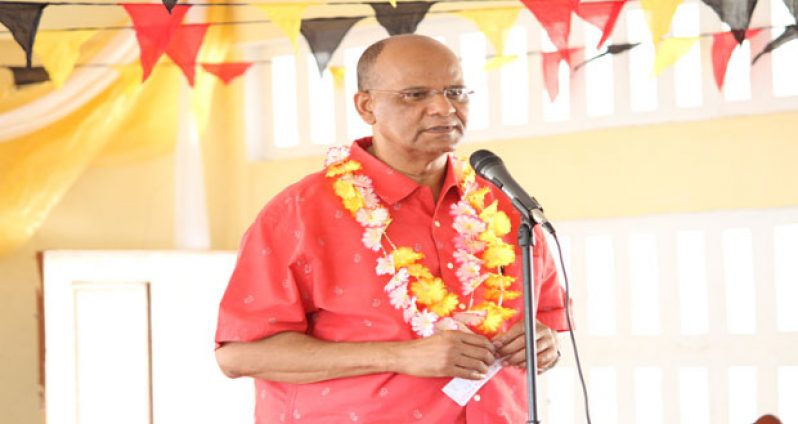REMEMBERING a fallen heroine and patriot, Kowsilla, who fought to death for the rights of sugar workers and women of the working class, Presidential Adviser and Government’s Chief Whip, Ms. Gail Texeira yesterday reminded women that they are “agents of change.”The remembrance day activity which reflected on the 50th death anniversary of Kowsilla, was held yesterday at the Leonora Secondary School, where hundreds of persons gathered to pay tribute to one of Guyana’s fallen hero, and icon.
In her remarks, Ms. Texeira emphasised that women have always contributed significantly to society, whether in Government or through civil society. Kowsilla’s death, she said, stands testimony to this fact. As such, she noted that women are “agents of change,” through every role they play in society.
This change, she said, came about through Guyana’s struggle for independence from British colonisers, through the struggle for democracy after independence, up until 1992, and even today as the struggle continues.
Reflecting on the past, the Chief Whip explained the limitations of being a woman in the days of Kowsilla, adding that labour laws and women’s rights were not known in that era, which put the working class, and women particularly, at a disadvantage.

However, this did not limit women in their involvement in social and political life, Texeira said, noting that women were always present to lend support in marches and peaceful protests for better working conditions and standards for average citizens. To this extent, she once again hinted at Kowsilla’s role in the fight for sugar workers, which led to her demise.
Many women who lived between the 1960’s and 1980’s period were so limited, to the extent that they could not read or write their names, the Chief Whip said. Their interests were not represented and emphasis was not placed on their role in society. The avenue which paved the way for the Guyana Agricultural Workers Union (GAWU) to become the representative body for the working class was the death of Kowsilla, she said, noting that this, to some extent, also paved the way for women’s rights and equality to evolve.
“Domestic violence is one of the main issues which confronted women in the past and even still does today. The difference though is that, years ago, violence against women was secretive. Women were afraid to speak out against it. Today, that is different. It is a criminal offence and that has showed where we have moved from, to where we are presently,” Ms. Texeira.
She explained that women are so empowered today that it is recorded that more women own house lots than men in Guyana. This, she said, is a marked improvement from when women have struggled for equality. She continued that years ago she remembered seeing women and children fetching water for miles, to wash their clothing and to cook. This, she said, is not a reality which faces us today, due to the positive changes and development in Guyana.
To this extent, the Chief Whip sought to remind women of their role in society and preserving the culture of being empowered through these roles they play. “Guyana is ranked 24th in the world when it comes to having women as Members of Parliament, and 29th when it comes to having female Ministers,” Ms. Texeira boasted.
Making a resounding presentation at the event was General Secretary of the People’s Progressive Party (PPP), Clement Rohee, who described Kowsilla as an extraordinary individual who made a “supreme sacrifice”, when she laid down her life for justice.
The General Secretary pointed to the fact that between 1964 and 1992, women could not challenge the Government and those who were in authority. The struggle in the days of Kowsilla, he said, was against oppression.
Rohee however lamented the need for more emphasis to be placed on this national hero, who not only made a sacrifice for the working class in Leonora, but fought in the struggle for a better Guyana.
“I think more needs to be done for people to understand what Kowsilla was all about. She was not an ordinary person. She stood out in the sense that she challenged the people who held political power. She challenged the ‘white-man’ and the British plantocracy. It was not an ordinary thing for an Indian woman or any person to stand up to the British,” Rohee said.

“It was as a result of the struggle and contributions of Kowsilla that we are enjoying what we are today,” the General Secretary said, noting that the conditions of working women today compared to the working conditions of women in the days of Kowsilla have vastly changed for the better.
Working women today, he said, have better conditions. “One woman told me today that they don’t have reasons to do what Kowsilla did, because their conditions are good enough,” Rohee disclosed.
Like the Chief Whip, the General Secretary also hinted at the fact that many like Kowsilla who had gone before, after and during her time, in their struggle for a better Guyana, have paved the way for the comfort in which we live today. “It was a result of their struggles and contributions that we are enjoying what we are today,” he said, making reference to the ballot box martyrs and many others, slain during the struggle for justice and equality.
As the attendees were educated on the political climate of Guyana at the time of Kowsilla’s death, they were reminded to reflect on the present political climate and the significance of their roles, in their homes, and communities, which aid in the development of the country.
Echoing the sentiments of these two speakers were also General Secretary of GAWU, Seepaul Narine, and representative of the Guyana Rice Producers Association, Jean Sahadeo, who both reflected on the life, work and invaluable contribution Kowsilla made to the society.
Cultural presentations were also offered by children from the Leonora, which was the birth place of Kowsilla. The cultural dance and singing of folksongs, though performed for entertainment purposes, aided in showcasing Guyana’s rich cultural heritage, of which all should be proud of.
Born in 1920 of humble, poor and hard-working parentage, this strong-willed woman, Kowsilla, from Seafield, Leonora, worked as a huckster on what was then Plantation Leonora on the West Demerara.
Being an executive member of the Women’s Progressive Organisation (WPO), she was actively involved in the struggle for liberation from colonial oppression and the imposition of a company union on the sugar workers by the expatriate company, Bookers.
An activist for the rights of a free people, Kowsilla was crushed while providing leadership and participating in one of the historic sugar worker struggles at Plantation Leonora.
The incident occurred when a scab driven tractor under an expatriate Estate Manager was driven into a crowd. ‘A Human Barricade’ gathered on the bridge to the Leonora sugar factory. Kowsilla died on the way to the Georgetown Public Hospital, while 14 others were injured.
The incident was sparked by a country-wide citizens’ march on January 31, 1964, to protest Duncan Sandy’s imposition of Proportional Representation.
Following the march, when the workers returned to assume their respective duties in the field and the factory, about half of them were not offered any work and those who worked were not paid the correct rates.
Twelve years after one woman’s sacrifice, on February 27, 1976, the Sugar Company was forced to sign a Recognition Agreement with the Guyana Agricultural Workers’ Union (GAWU), after a poll was held in the sugar industry on December 31, 1975. Ninety-eight percent of the workers voted for GAWU.
The ultimate price for what one woman believed in did not go in vain and in honouring her memory, 50 years later, members of GAWU, WPO and the PPP gathered at the Leonora Secondary School, as they remembered Kowsilla’s sacrifice and contribution to the country.





.jpg)








